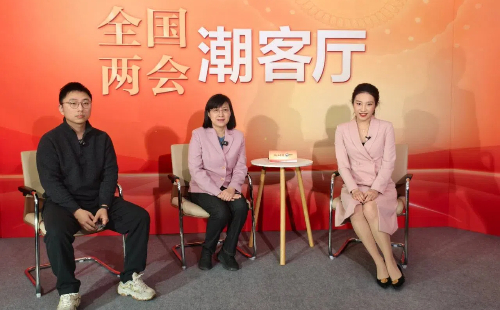Harnessing technology to break accessibility barriers

Yang Yang (middle) is interviewed in Beijing on March 3. [Photo/Tide News]
Yang Yang, a member of the 14th National Committee of the Chinese People's Political Consultative Conference and part-time vice-chairwoman of the eighth presidium of the China Disabled Persons' Federation, says that technology is transforming the lives of people with disabilities.
Born in Hangzhou, Yang lost her hearing at the age of four but never stopped striving for a better future. In 1992, she was admitted to the mathematics department at Hangzhou University — now a part of Zhejiang University, becoming the first hearing-impaired student in China to enter a mainstream university through equal competition since the founding of the China Disabled Persons' Federation.
Reflecting on her personal journey, Yang calls for greater efforts to develop assistive technology and create a more inclusive information environment.
For more than 40 years, Yang lived in silence. In 2011, she received her first cochlear implant, and for the first time, she could clearly hear sounds that most people take for granted — the whistle of a boiling kettle, the ticking of a clock, birds chirping, ocean waves crashing, and raindrops falling.
In 2015, after becoming a mother, she realized that her single cochlear implant was not enough to hear her child's whispered words at bedtime. In 2018, she underwent a second cochlear implant surgery.
"I wanted to fully understand my child's words, to have nighttime conversations in the dark," she said. It took a year of rehabilitation before she could fully process the sounds around her. "It felt like surfacing from deep underwater and finally seeing the world as it truly is," she recalled.
Yang has been a strong advocate for making cochlear implants more affordable. In 2023, she proposed including adult cochlear implants in China's national health insurance system, a move that has since gained traction. In December 2024, China launched a centralized procurement program for cochlear implants, securing 11,000 units from domestic and international manufacturers at reduced costs.
"Every step forward in disability support uplifts not just individuals with disabilities but also their families," Yang said.
This year, she continues to push for accessibility improvements, including real-time speech-to-text displays on public transportation, dedicated accessibility services on government hotlines, and inclusive accommodations for professional certification exams. "For those with hearing impairments, a simple display screen or a handwritten note could be a lifeline," she said.
Yang is encouraged to see more tech companies joining the effort, continuously improving assistive products and making life-changing innovations accessible to more people.
"Technology should be at the heart of efforts to enhance the lives of people with disabilities. It is not just about assistance — it is about empowerment, inclusion, and the ability to 'see', 'hear', and go further than ever before," she said.


